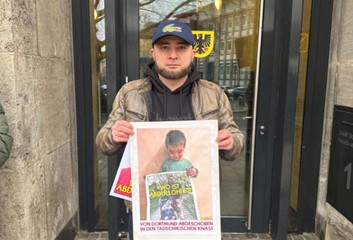Update: In an earlier published version of this text we stated that Mr. Ergashev is a member of the opposition group “Group 24”. The correct information is that he is a member of the opposition group “the Reforms and Development of Tajikistan” movement. This has been corrected in the updated text.
At around 08:00 in the morning of October 28, German police officers detained Tajik refugee Dilmurod Ergashev in the city of Kleve. Following his detention, he was brought to the Kleve administrative court which ordered his deportation to Tajikistan, scheduled between November 5 and 7. Awaiting deportation, Mr. Ergashev remains in custody since his detention. The court’s order to deport him comes while his application for political asylum is still pending review by the Düsseldorf administrative court, activists told the Norwegian Helsinki Committee.
Since December 2014, Mr. Ergashev is a member of the Tajik opposition group “the Reforms and Development of Tajikistan” movement. His active and visible participation in opposition activities in exile is well documented – he has taken part in numerous peaceful public protests, including demonstrations held in Berlin outside the Tajik embassy in April 2015, December 10, 2018, and September 28–29, 2023, as well as in other German cities. He has remained an outspoken critic of Tajik president Emomali Rahmon’s regime, regularly using social media to share criticism of Tajik authorities and information about human rights violations in Tajikistan; to advocate for democratic principles, and to promote human rights. These activities mark him as a target for Tajik authorities who have been regularly retaliating against, imprisoning on politically motivated grounds, exposing to torture and other ill-treatment and otherwise persecuting peaceful critics en masse during the last ten years.
In February 2011, Mr. Ergashev applied for political asylum in Germany. Despite his claims of persecution in Tajikistan, German authorities have rejected several of his applications for protection.
Germany’s international human rights obligations commit the country to refrain from forcibly returning Mr. Ergashev to Tajikistan. The European Convention on Human Rights; the United Nations Convention against Torture and Other Cruel, Inhuman or Degrading Treatment and Punishment; the 1951 Geneva Convention on the Status of Refugees; as well as the principle of non-refoulement, all prohibit the forced return of individuals to a country where they could face torture.
Ergashev’s case shares similarities with the cases of other peaceful Tajik activists who have been deported from Germany in recent years. In early 2023, Germany deported Shamsiddin Abdullohi – an active protester and son of a high-ranking member of the peaceful opposition party Islamic Renaissance Party of Tajikistan – to Tajikistan. Upon his arrival, he was detained, placed in the detention centre of the feared security services and later sentenced to seven years’ imprisonment on bogus charges.
In November 2023, German authorities deported Bilol Kurbonaliyev, another member of “Group 24” who had participated in the public protests against Tajik president Emomali Rahmon during his visit to Berlin in September of that year. When he arrived in Tajikistan, he was detained by the security services and later sentenced to ten years’ imprisonment.
Contact us
Employee
